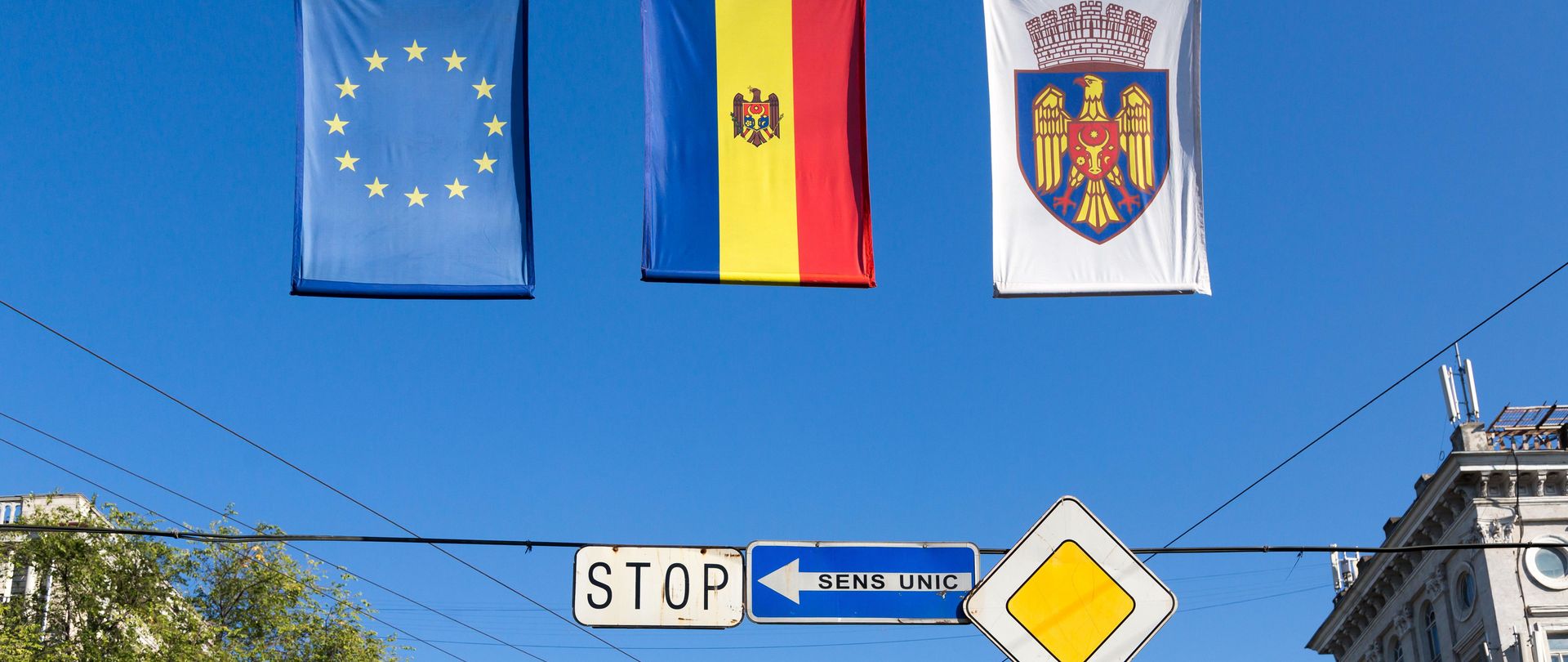
The flag of the Republic of Moldova, the EU flag and a flag with the Chisinau city coat of arms next to each other on Moldova's Independence Day.
© picture alliance / Caro | Bastian
EU enlargement and reform
The long-stagnant policy field of EU enlargement has gained new political momentum since Russia's war of aggression against Ukraine and the resulting accession prospects for Ukraine, Moldova and Georgia. EU leaders now refer to enlargement as a "geopolitical investment" for peace, prosperity and security in Europe. The accession processes of the Western Balkans are also to be revitalised. Yet the EU has lost credibility in these countries, some of which have been waiting 20 years for major progress, while the necessary reforms in the rule of law and democracy have yet to materialise. At the same time, enlargement policy has become part of the EU's geostrategic competition with Russia and China.
The current status of nine European countries seeking EU membership promises to increase the EU's future geopolitical weight. On the flip side, an EU comprising over 30 member states would be compelled to acknowledge that the current decision-making procedures could sooner or later lead to intractable blockages and problems, many of which already exist today. The question of how to approach enlargement and institutional as well as policy reforms in parallel will therefore be issues that will not only be addressed in the upcoming EU election campaign. Furthermore, the question of gradual accession to the EU and the parallel debate on the necessity of reforms to the Union's budget, policies and institutions are likely to be a central focus of the strategic agenda for the 2024-2029 legislative period.
Publications
Enlargement
-
Towards a »European Family Action Plan«: transitionary integration as a path to EU membership
in: Italian Institute for International Political Studies, Commentary, 06.06.2024 -
EU Enlargement: Geopolitics Meets Integration Policy
The EU Is Set to Add Gradualist Elements to Its Enlargement Doctrine
SWP Comment 2024/C 01, 11.01.2024, 8 Pagesdoi:10.18449/2024C01
-
Getting Ready
Ukraine’s potential accession and EU institutional reform
in: Verfassungsblog: On Matters Constitutional, 22.12.2022 -
Ukraine’s possible EU accession and its consequences
The European Council has granted Ukraine candidate status. Despite political momentum, the road into the EU will be long and arduous. What challenges do the EU and Ukraine face in preparing for accession and eventual admission? This 360 Degrees was coordinated by Nicolai von Ondarza.
360 degrees, 22.07.2022 -
Ukraine’s Membership Bid Puts Pressure on the European Union
A Security Policy Flanking, Not a Revision of EU Enlargement Policy, Is Advisable
SWP Comment 2022/C 21, 24.03.2022, 7 Pagesdoi:10.18449/2022C21
Reform
-
The Radicality of Sunlight
Five Pathways to a More Democratic Europe
Report of the CEPS-SWP High-Level Group on Bolstering EU Democracy, October 2023 -
Sailing on High Seas: Reforming and Enlarging the EU for the 21st Century
Report of the Franco-German Working Group on EU Institutional Reform, 18.09.2023 -
The Crisis Governance of the European Union
More responsibility requires more democratic legitimacy
SWP Research Paper 2023/RP 10, 04.09.2023, 35 Pagesdoi:10.18449/2023RP10
-
More EU Decisions by Qualified Majority Voting – but How?
Legal and political options for extending qualified majority voting
SWP Comment 2022/C 61, 19.10.2022, 8 Pagesdoi:10.18449/2022C61
-
The Future of Europe: From Conference to Convention?
Centre for European Policy Studies (CEPS), Webinar, 26.09.2022 (Video) -
After the Conference on the Future of Europe: Time to Make Reforms Happen
Four lessons for a European Union again requiring a new balance between deepening and widening
SWP Comment 2022/C 49, 26.08.2022, 7 Pagesdoi:10.18449/2022C49